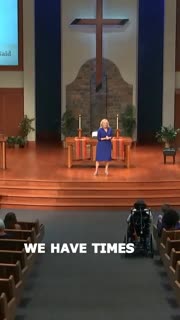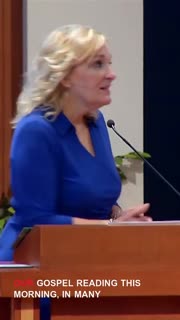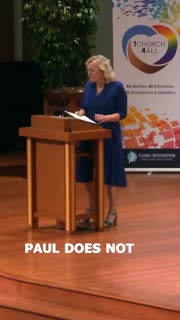Understanding God's Support in Our Struggles
Devotional
Sermon Summary
Bible Study Guide
Sermon Clips
### Quotes for Outreach
1. "We have times and moments in the life of our church together where we celebrate and we bless one another. Today is one of those days. I want to invite Shel Lewis-Akasiaka forward on our staff. I'm looking for Shel, and I'm missing her in the room. Is she out? One moment. She's coming running. Shel, you may know her as she comes forward. Come on up, Shel. Yeah, come on up." [22:27] (25 seconds)
2. "Our gospel reading this morning, in many ways, it picks up to where we left off last week. If you were with us, we talked about why we do mission. Why do we do mission work? Why do we go abroad and do mission? And we hear in the gospel as Jesus is getting ready to ascend into heaven, he says to disciples, go, go, go. Go, basically, to the ends of the earth and make disciples of all nations. He says this, and then he offers a promise at the end that he will be with us." [48:49] (32 seconds)
3. "We have a Savior who says, come to me, right? If you're weary and you're heavy laden, I will give you what? Rest. You know this. These are the words of Christ. Not buck up on your own and you can handle it because God has been piling the stuff on you. This is why we don't say these things. This is why we're careful about what we know about Scripture, what Christ really said, and what those that are in the midst of it know." [01:06:47] (27 seconds)
4. "Bear one another's burdens, and in this way you will fulfill the law of Christ. Could you read this with me? Bear one another's burdens, and in this way you will fulfill the law of Christ. This is the way of Christ, is that we don't try to put a quick fix on someone's trauma or on their deep difficulty. But we walk with them through that burden." [01:07:33] (29 seconds)
5. "I invite you now to stand either in body or in spirit as we sing together. And they will. They will church. They'll know. As you go from this place remember that. Remember that you have God's love inside you. And the world needs that in incredible ways. They need to be reminded that God is faithful. They need to be remindful that Christ does not abandon. They need to be reminded that they're good compassionate people in this world and that's you." [01:13:18] (60 seconds)
### Quotes for Members
1. "When we say this, God will not give you more than you can handle. The focus is not on God. It's on your handling it. And that's what I want to point to this morning. If this is something you said or it's been said to you, it's wrong. Because we say, when we say that it's like you must have enough strength. You have to buck up. Because God's not going to give you more than you can handle. No. Paul just reverses that and said, God is our rescuer." [01:05:18] (27 seconds)
2. "Paul does not speak. When we say this, God will not give you more than you can handle. The focus is not on God. It's on your handling it. And that's what I want to point to this morning. If this is something you said or it's been said to you, it's wrong. Because we say, when we say that it's like you must have enough strength. You have to buck up. Because God's not going to give you more than you can handle. No. Paul just reverses that and said, God is our rescuer." [01:05:18] (29 seconds)
3. "Paul writes this also. He writes, as he's talking about the work of Holy Spirit over in Galatians, he writes this, and it's beautiful. Let's take a look at that text. Bear one another's burdens, and in this way you will fulfill the law of Christ. Could you read this with me? Bear one another's burdens, and in this way you will fulfill the law of Christ. This is the way of Christ, is that we don't try to put a quick fix on someone's trauma or on their deep difficulty. But we walk with them through that burden." [01:07:33] (39 seconds)
4. "God calls us to be faithful as Christ is faithful and sometimes in that business of where Christ says I will be with you to the end of the age. It is you and it's me that's being called to be presence within a situation. The presence of Christ is so important. You might not have the words to know what to say to that friend or family member that has that deep deep pain. But to be. To be present with them to love them to not walk away when a lot of people will walk away." [01:11:11] (36 seconds)
5. "People don't understand the long haul of things sometimes but we as people of Christ were called to that. So this morning as we as we put those words behind us as we pick up this word of Christ who is with us. I want you to think before we close out about who God might be calling you to be present with. Who's suffering. Who's got that condition that just keeps eating at them and they're on your heart and you want to do something. I want you to pray with me this morning that God will show you a way to be present to reveal the face of Christ in your presence and your love and your affirmations of God's faithfulness to them." [01:11:11] (50 seconds)
Ask a question about this sermon
1. "We have times and moments in the life of our church together where we celebrate and we bless one another. Today is one of those days. I want to invite Shel Lewis-Akasiaka forward on our staff. I'm looking for Shel, and I'm missing her in the room. Is she out? One moment. She's coming running. Shel, you may know her as she comes forward. Come on up, Shel. Yeah, come on up." [22:27] (25 seconds)
2. "Our gospel reading this morning, in many ways, it picks up to where we left off last week. If you were with us, we talked about why we do mission. Why do we do mission work? Why do we go abroad and do mission? And we hear in the gospel as Jesus is getting ready to ascend into heaven, he says to disciples, go, go, go. Go, basically, to the ends of the earth and make disciples of all nations. He says this, and then he offers a promise at the end that he will be with us." [48:49] (32 seconds)
3. "We have a Savior who says, come to me, right? If you're weary and you're heavy laden, I will give you what? Rest. You know this. These are the words of Christ. Not buck up on your own and you can handle it because God has been piling the stuff on you. This is why we don't say these things. This is why we're careful about what we know about Scripture, what Christ really said, and what those that are in the midst of it know." [01:06:47] (27 seconds)
4. "Bear one another's burdens, and in this way you will fulfill the law of Christ. Could you read this with me? Bear one another's burdens, and in this way you will fulfill the law of Christ. This is the way of Christ, is that we don't try to put a quick fix on someone's trauma or on their deep difficulty. But we walk with them through that burden." [01:07:33] (29 seconds)
5. "I invite you now to stand either in body or in spirit as we sing together. And they will. They will church. They'll know. As you go from this place remember that. Remember that you have God's love inside you. And the world needs that in incredible ways. They need to be reminded that God is faithful. They need to be remindful that Christ does not abandon. They need to be reminded that they're good compassionate people in this world and that's you." [01:13:18] (60 seconds)
### Quotes for Members
1. "When we say this, God will not give you more than you can handle. The focus is not on God. It's on your handling it. And that's what I want to point to this morning. If this is something you said or it's been said to you, it's wrong. Because we say, when we say that it's like you must have enough strength. You have to buck up. Because God's not going to give you more than you can handle. No. Paul just reverses that and said, God is our rescuer." [01:05:18] (27 seconds)
2. "Paul does not speak. When we say this, God will not give you more than you can handle. The focus is not on God. It's on your handling it. And that's what I want to point to this morning. If this is something you said or it's been said to you, it's wrong. Because we say, when we say that it's like you must have enough strength. You have to buck up. Because God's not going to give you more than you can handle. No. Paul just reverses that and said, God is our rescuer." [01:05:18] (29 seconds)
3. "Paul writes this also. He writes, as he's talking about the work of Holy Spirit over in Galatians, he writes this, and it's beautiful. Let's take a look at that text. Bear one another's burdens, and in this way you will fulfill the law of Christ. Could you read this with me? Bear one another's burdens, and in this way you will fulfill the law of Christ. This is the way of Christ, is that we don't try to put a quick fix on someone's trauma or on their deep difficulty. But we walk with them through that burden." [01:07:33] (39 seconds)
4. "God calls us to be faithful as Christ is faithful and sometimes in that business of where Christ says I will be with you to the end of the age. It is you and it's me that's being called to be presence within a situation. The presence of Christ is so important. You might not have the words to know what to say to that friend or family member that has that deep deep pain. But to be. To be present with them to love them to not walk away when a lot of people will walk away." [01:11:11] (36 seconds)
5. "People don't understand the long haul of things sometimes but we as people of Christ were called to that. So this morning as we as we put those words behind us as we pick up this word of Christ who is with us. I want you to think before we close out about who God might be calling you to be present with. Who's suffering. Who's got that condition that just keeps eating at them and they're on your heart and you want to do something. I want you to pray with me this morning that God will show you a way to be present to reveal the face of Christ in your presence and your love and your affirmations of God's faithfulness to them." [01:11:11] (50 seconds)










